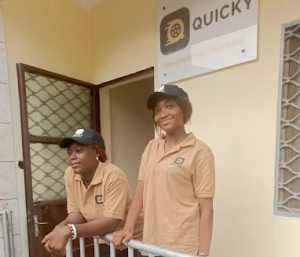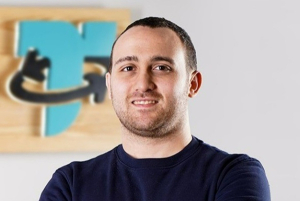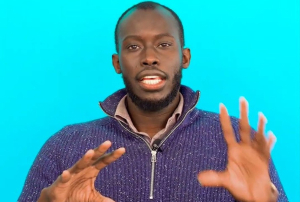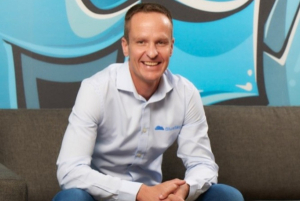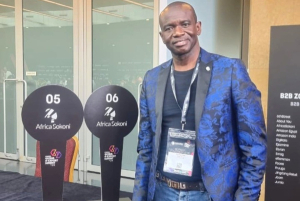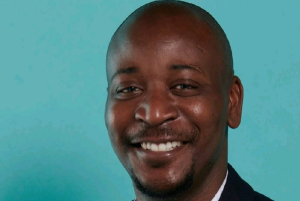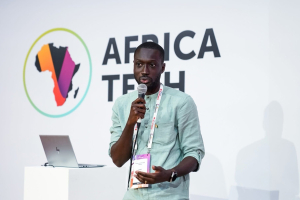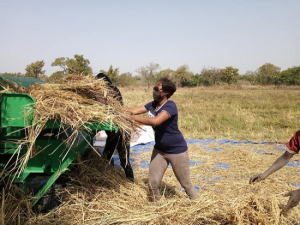iKhokha CEO Matt Putman Expands Access to Digital Payments in Africa
South African entrepreneur Matt Putman has emerged as one of the key players shaping electronic payments on the continent. As co-founder and chief executive of fintech firm iKhokha, he has focused on helping small merchants and businesses adopt digital tools.
Founded in 2012 with Ramsay Daly and Clive Putman, iKhokha offers affordable electronic payment solutions through mobile point-of-sale devices certified by major card networks. Merchants can accept payments via cards, e-wallets, and QR codes.
The company integrates services such as cash register management, reporting, invoicing, e-commerce and microfinancing into a single mobile application. It has also developed a cash advance product to improve access to credit for small enterprises often excluded from traditional banking.
In August 2025, Nedbank acquired iKhokha for about $94 million. Despite the acquisition, the company continues to operate with independent management, allowing it to preserve its entrepreneurial approach while leveraging the bank’s resources.
Putman graduated with a bachelor’s degree in media and communications from the University of KwaZulu-Natal in 2006. He began his career in 2003 in the UK at TMP Worldwide, an agency specialized in digital and social transformation of employer branding. Between 2006 and 2009, he worked as marketing director at Mainline Property Brokers, a real estate company.
This article was initially published in French by Melchior Koba
Adapted in English by Ange Jason Quenum
AI Entrepreneur Serisha Barrat Democratizes Legal Access in Africa
South African entrepreneur Serisha Barrat is reshaping Africa’s legal landscape through technology. As cofounder and chief executive of Lawyered Up, she combines law, business, and artificial intelligence to help companies streamline legal operations.
Founded in 2020, Lawyered Up focuses on digitalizing legal services across the continent. The platform uses AI to automate and simplify legal management for small and medium-sized firms as well as large corporations.
Lawyered Up offers an end-to-end solution for contract lifecycle management. It integrates digital workflows to accelerate processes, reduce costs, and ensure regulatory compliance. The system also supports businesses in meeting African business law requirements and advancing environmental, social and governance (ESG) goals.
Beyond Lawyered Up, Barrat co-founded OPUS in 2023, a collective of entrepreneurs and creators designed to foster idea-sharing and collaboration. She previously launched eCrow Media in 2018, a social media marketing agency where she served as digital marketing director until 2020.
Barrat graduated with a law degree from the University of Witwatersrand in 2015. She began her career at Nedbank in 2013 as promotions assistant, then joined Standard Bank Group in 2015, serving as legal advisor, compliance manager, and corporate lawyer.
In 2018, she moved to Old Mutual Wealth as a legal and compliance analyst. Between 2020 and 2022, she led marketing at Here Marketing and simultaneously worked as marketing director at StartX, a start-up accelerator. From 2023 to April 2025, she was CEO of Boardroom App, a professional networking application.
In 2023, Women in Tech and EQL Her named Barrat among the 50 most influential women in technology. In 2024, the Mail & Guardian ranked her in its annual list of the 200 most promising young South Africans.
This article was initially published in French by Melchior Koba
Adapted in English by Ange Jason Quenum
Cameroon's Quicky Services Bridges Clients and Providers Via Mobile App
- Cameroonian startup Quicky Africa launched "Quicky Services," a mobile application connecting clients with service providers across multiple sectors.
- The app, available on iOS and Android, has over 500 downloads and emphasizes vetted professionals and transparent pricing.
- The platform faces challenges including logistical reliability, quality control, and coverage in less dense areas.
As on-demand mobile services gain traction, Cameroonian startup Quicky Africa has introduced a suite of applications. Its success will depend on its ability to retain both end-users and service providers.
Quicky Services, a mobile application developed by Quicky Africa, aims to link service providers and clients across various sectors. The offering encompasses transport, maintenance, repair, wellness, and lifestyle services. Ossoe Pierre Harisson and Liliane Mitambo launched the Yaoundé-based startup in 2025.
Its solution includes a mobile application accessible on both iOS and Android platforms, where it has garnered over 500 downloads, according to Play Store data. Users create accounts by providing personal information; upon account validation, they access diverse service providers in the aforementioned fields.
The startup claims to prioritize reliability by selecting professionals whose profiles undergo background verification, which enhances user trust. Service prices are presented unequivocally at the time of booking and, importantly, during payment. Regarding payment methods, the application integrates mobile money from telecom networks, but cash payments are also permitted.
The user experience incorporates geolocation, proximity-based provider selection, and features for comparing offers. The iOS version specifically mentions the distance between the requested address and each provider. However, the solution still faces challenges including logistical reliability, quality control, and coverage in less dense areas.
This article was initially published in French by Adoni Conrad Quenum
Adapted in English by Ange Jason Quenum
Mohammed Elhorishy Structures E-commerce for Egyptian SME
Mohammed Elhorishy, an entrepreneur with a background in finance, is leveraging technology to empower small and medium-sized enterprises (SMEs) in Egypt to operate more efficiently in the e-commerce sector.
Elhorishy is the co-founder and Managing Director of Taager, a business-to-business (B2B) e-commerce platform launched in 2019. Taager was founded by Abdelrahman Sherief, Ahmed Ismail, Ismail Omar, and Mohammed Elhorishy.
Taager provides a comprehensive digital infrastructure for SMEs across the Middle East and North Africa (MENA) region. This infrastructure encompasses sourcing, warehousing, logistics, and market linkage through its marketplace. The company emphasizes that Taager is pioneering a new model for B2B e-commerce in the MENA region, aiming to democratize online retail by offering integrated solutions that cover sourcing, logistics, and marketing, all fueled by data-driven innovation and a commitment to empowering entrepreneurs.
The startup facilitates the digital transition for retail players by offering an integrated solution. It aggregates suppliers, manages inventory through its warehouses, and handles distribution via its proprietary logistics service.
Elhorishy graduated from the British University in Egypt in 2012 with a Bachelor’s degree in Economics. He began his career in 2013 as a financial analyst at the Economic Group for Financial Consulting in Egypt. Subsequently, he joined Misr Financial Investments as an investment analyst. From 2015 to 2020, he was part of the private equity team at FEP Capital, an investment firm in Egypt.
This article was initially published in French by Melchior Koba
Adapted in English by Ange Jason Quenum
Senegalese Entrepreneur Massar Sall Bridges Restaurants and Suppliers with WholeOrder
-
Massar Sall launches WholeOrder, a B2B platform connecting African restaurants and suppliers.
-
The platform aims to optimize food supply chains, reduce waste, and improve logistics.
-
WholeOrder addresses unique African market challenges, leveraging Sall's actuarial and data engineering expertise.
New digital solutions are rapidly transforming supply chain management for businesses across Africa. At the forefront of this evolution is Massar Sall, a Senegalese data engineering consultant and tech entrepreneur, who is connecting restaurants and suppliers through his innovative platform, WholeOrder.
Founded in 2024, WholeOrder is a business-to-business (B2B) online platform specifically designed to optimize the food supply chain in Africa. As its founder and CEO, Sall aims to streamline the procurement process for restaurants, thereby reducing food waste and enhancing logistical efficiency for culinary professionals.
The digital platform automates order management, facilitating seamless interactions between various stakeholders in the food service industry. By digitalizing this critical function, WholeOrder provides a tailored solution to the unique challenges prevalent in African markets, where food distribution often faces significant hurdles.
Sall brings a robust background to his entrepreneurial venture. He holds a degree in statistical and financial engineering, earned in 2018 from the Université Panthéon-Assas in Paris. His professional career commenced in 2016 at Wakam (formerly La Parisienne Assurances), where he served as an actuarial studies intern.
In 2017, he joined Société Générale Insurance as an actuarial studies officer. By 2018, he transitioned to EB Partners, a firm specializing in insurance technology, as an international actuary. Most recently, from 2021 to 2024, Sall worked as a data engineer at AXA, the parent company of EB Partners.
This article was intially published in French by Melchior Koba
Adapted in English by Ange Jason Quenum
Matt Surkont Powers Business Digital Transformation with BlueSky
Matt Surkont is a South African technology entrepreneur and investor. He builds digital services, launches innovative businesses, and backs high-impact projects. He holds stakes in multiple South African companies.
As founder and CEO of BlueSky, established in 2017, Surkont drives digital transformation for South African organisations. BlueSky focuses on cloud solutions, artificial intelligence, and integration services.
The company covers the full technology cycle—strategy, deployment, integration, training, and ongoing support. It partners globally with firms like Salesforce, Amazon Web Services, Tableau, Alteryx, Snowflake, and Databricks.
BlueSky offers cloud architecture, data analysis, automation, app development, CRM integration, cybersecurity, customer experience management, and team support.
Matt Surkont co-founded Lodestone, a venture capital company dedicated to developing innovative technology projects. He holds investments in Pandora Health, an AI-based precision medicine platform, and Coot Club, an accommodation venture located in a 464-hectare private nature reserve.
He joined the international YPO network and in 2004 founded Resolve Red, providing Oracle services to clients across public and private sectors.
Surkont earned a Bachelor’s degree in Information Systems from the University of Cape Town in 1999 and began his career as a software engineer at the Bank of Ireland. He later invested in multiple South African startups, including Bloomable, an online flowers and gifts platform, and Khonology, a technology services company.
This article was initially published in French by Melchior Koba
Edited in English by Ange Jason Quenum
Gambian Tech Entrepreneur Ebrima Fatty Builds Africa-Focused Digital Marketplace
Ebrima Fatty, a Gambian entrepreneur with over two decades of experience in finance and technology, is connecting local producers, retailers, and consumers through a digital platform he created.
Fatty is the founder and CEO of AfricaSokoni, a London-based e-commerce company launched in 2017. The platform targets African markets, with a strong focus on Kenya.
AfricaSokoni, which means "market" in Swahili, links local businesses, producers, and artisans to regional demand. It also gives individuals easy access to a broad range of goods through its user-friendly online interface.
The platform supports small and medium-sized enterprises (SMEs), farmers, and artisans with tools for supply chain management, financing, and digital promotion. For everyday consumers, AfricaSokoni offers products in electronics, fashion, beauty, home appliances, and telecommunications.
AfricaSokoni integrates services like inventory management, stock tracking, automated orders, and supplier relationship management. The company also builds partnerships to help small businesses manage cash flow and access services like marketing, content creation, packaging, and logistics—even paving the way to international markets.
"AfricaSokoni is a comprehensive platform dedicated to empowering the MSME sector in Africa and helping businesses grow and thrive. If you are a small or medium-sized business looking to succeed in Africa, we invite you to join our platform and discover the many ways we can support you," the company says.
Alongside his entrepreneurial work, Fatty serves as a product manager at the Islamic Development Bank (IsDB) in Saudi Arabia.
He earned his Master's degree in Accounting and Finance from the University of Maiduguri, Nigeria, in 2000.
Fatty began his career the same year at Deloitte as a senior auditor. In 2001, he joined the Gambia Capacity Building for Economic Management Project as financial controller. There, he worked on strengthening government capacity in economic policy, judicial reforms, and private sector development until 2005.
This article was initially published in French by Melchior Koba
Edited in English by Ange Jason Quenum
Franco-Gabonese Entrepreneur Nguema Etoh Ibrahim Reinvents Shared Housing with EKNA
Nguema Etoh Ibrahim, a Franco-Gabonese entrepreneur trained in France, has launched a bold mission: transform the shared housing experience through digital innovation. Based in the Lille region, he now leads EKNA, a start-up he co-founded in 2020 with Florine Dufour.
EKNA operates through a dual-function system: a mobile app for flatmates and a platform for landlords. The mobile app allows users to find and book shared accommodation easily—regardless of their rental history. Using an algorithm-driven matching system, EKNA suggests compatible flatmates based on users' lifestyles and preferences.
For landlords, EKNA provides a dashboard to post listings, review detailed tenant profiles, and assess compatibility with current flatmates. Each application includes a rental score and a personality match indicator, streamlining the selection process.
“EKNA has been developed and now consists of a mobile application for people looking for a flat share, and a platform for landlords (private individuals or professionals) to manage their accommodation adverts and choice of flatmates! But that's just the beginning, and we promise you plenty more great features to come,” said the start-up.
Landlords can publish listings across multiple channels and reach EKNA’s entire user base. The platform also simplifies tenant rotation and communication within shared flats, making management smoother and less time-consuming.
Nguema Etoh Ibrahim holds a degree in computer-aided design and drafting from Lille’s University Institute of Technology (IUT). He started his career in 2017 as an electrical draughtsman at Société Nouvelle d'Installations Électroniques (SNIE) in France.
In 2018, he joined Inéo Infracom as a GSM design technician. He later worked at the Vincent Delsinne architecture studio as an assistant architect. In 2019, he became a works supervisor at CRITES, a firm focused on electrical engineering and communication systems.
This article was initially published in French by Melchior Koba
Edited in English by Ange Jason Quenum
Ivorian Entrepreneur Cedric Ceruya Oka Baidai Develops Digital Tools to Boost E-Commerce in West Africa
Ivorian tech entrepreneur and engineer Cedric Ceruya Oka Baidai is building digital solutions to make e-commerce easier and safer for users and businesses in Côte d’Ivoire and across West Africa.
Cedric Ceruya Oka Baidai leads Aynid, a startup he founded in 2024. The company develops integrated tools that support buying and selling online—addressing local market needs with customized digital services.
The startup has launched several core services. Aynid Search is a vertical search engine designed for e-commerce. It allows users to find specific products or services in seconds.
Next is Aynid Shop, a smart marketplace. It includes automated store management, marketing tools, a sales tracking dashboard, and an instant messaging system. Sellers can manage offers, track sales, and handle payments through one streamlined interface.
Aynid is expanding its portfolio. Soon, it will launch Aynid Pay, a payment gateway to handle collections and withdrawals. The company also plans to roll out Aynid Delivery, a logistics service that uses QR code tracking and affordable pricing.
Aynid showcased its platform at Viva Technology, a major startup and innovation event held on June 14–15.
Before launching Aynid, Cedric Ceruya Oka Baidai co-founded Fermentuse, a web development agency, in 2012. He served as technical director there until 2020.
Cedric Ceruya Oka Baidai holds a diploma in electronics from the Félix Houphouët-Boigny National Polytechnic Institute (2010) and a telecommunications engineering degree from HETEC in Abidjan (2013).
He became a software engineer in 2015 at Raven’s Digital Team. A year later, he joined VEONE as a programmer analyst. He now heads the company's research and innovation department.
This article was initially published in French by Melchior Koba
Edited in English by Ange Jason Quenum
Beninese Startup Ikena Simplifies Sales for Agricultural Cooperatives
A young startup in Benin is making it easier for small farmers to sell their goods and reduce post-harvest losses. Africereal, a tech company based in Abomey-Calavi, built the Ikena platform to help cooperatives and producers reach more buyers.
Ikena allows farmers, cooperatives, and agribusinesses to create digital storefronts where they can display and sell their produce. The platform promotes transparency by giving buyers clear information on product origin, availability, and price.
Founded in 2017 in Abomey-Calavi, Benin, as AfriRice by Steve Hoda and Maya Dohou, the startup received the official “startup” label from the Beninese Ministry of Digital Economy and Digitalization on July 3, valid for three years.
Users can browse listings of fruits, tubers, grains, and processed agro-industrial products. The platform currently works only through a web browser—no mobile app is available yet.
“To sell your products, simply create an account, complete your seller profile, and post your listings with details such as name, quantity, price, description, and photos. Once approved, your listing will be visible to potential buyers,” the company states.
Buyers can message sellers directly to resolve issues. If problems persist, they can report disputes through their account. Ikena’s support team reviews each case and takes action when needed.
Delivery times depend on the seller and the shipping method, usually ranging from 3 to 7 business days. Once shipped, the buyer receives a tracking number to monitor the order.
Ikena focuses on making digital commerce accessible to farmers who are often left out of traditional online markets. Its design prioritizes ease of use and seller assistance.
This article was initially published in French by Adoni Conrad Quenum
Edited in English by Ange Jason Quenum




